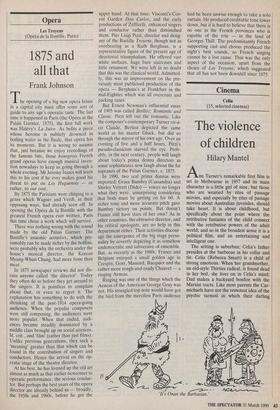Opera
Les Troyens (Opera de la Bastille, Paris)
1875 and all that
Frank Johnson
The opening of a big new opera house in a capital city must offer some sort of guide to any age's operatic taste. The last time it happened in Paris (the Opera at the Palais Gamier, 1875), the first full work was Halevy's La Juive. As befits a piece whose heroine is publicly drowned in boiling water as the finale, that opera has its moments. But it is wrong to assume that, just because we enjoy recordings of the famous bits, those bourgeois French grand operas have enough musical inven- tion nowadays to keep us going through a whole evening. Mr Jeremy Isaacs will learn this to his cost if he ever makes good his threat to put on Les Huguenots — or rather, to our cost.
By 1875 the Parisians were clinging to a genre which Wagner and Verdi, in their opposing ways, had already seen off. In opening the Opera de la Bastille with the greatest French opera ever written, Paris this time chose a work which will survive.
There was nothing wrong with the sound made by the old Palais Gamier. The Bastille's anaemic acoustics, which pre- sumably can be made richer by the boffins, were probably why the orchestra under the house's musical director, the Korean Myung-Whun Chung, had more bone than meat.
In 1875 newspaper reviews did not dis- cuss anyone called 'the director'. Today they often do so before they get around to the singers. It is pointless to complain about that, or even to regret it. The explanation has something to do with the shrinking of the post-1914 opera-going audience. When the popular composers were still composing, the audiences were more popular. When that ended, audi- ences became steadily dominated by a middle class brought up on social sciences, lit. crit., and 'film' (rather than just films). Unlike previous generations, they seek a `meaning' greater than that which can be found in the contribution of singers and conductors. Hence the arrival on the op- eratic stage of the theatre director.
At his best, he has livened up the old art almost as much as that earlier newcomer to operatic performance, the serious conduc- tor. But perhaps the best years of the opera director are already behind us — broadly, the 1950s and 1960s, before he got the
upper hand. At that time, Visconti's Cov- ent Garden Don Carlos, and the early productions of Zeffirelli, enhanced singers and conductor rather than diminished them. Pier Luigi Pizzi, director and desig- ner of the Bastille Troyens, though not as overbearing as a Ruth Berghaus, is a representative figure of the present age of directorial triumphalism. He offered vast white surfaces, huge bare staircases and little ornament. We were left in no doubt that this was the classical world. Admitted- ly, this was an improvement on the pre- viously most publicised production of the opera — Berghaus's at Frankfurt in the mid-Eighties which was all overcoats and packing cases.
But Ernest Newman's influential essay of 1905 was called Berlioz: Romantic and Classic. Pizzi left out the romantic. Like the composer's contemporary Turner vis-a- vis Claude, Berlioz depicted the same world as his master Gluck, but did so through the mirror of his own age. Over an evening of five and a half hours, Pizzi's pseudo-classicism starved the eye. Prob- ably, in the next century, people will laugh about today's prima donna directors as some sophisticates now laugh about the fat sopranos of the Palais Gamier, c. 1875.
In 1990, two real prima donnas were imported: Grace Bumbry (Cassandra) and Shirley Verrett (Dido) — voices no longer what they were, unsurprising considering that both must be getting on for 60. A richer tone and more accurate pitch gave Bumbry victory on points. But doesn't France still have stars of her own? As in other countries, the obtrusive director, and his critical apologists, are no help in this department either. Their activities discour- age the emergence of the big stage perso- nality by covertly depicting it as somehow undemocratic and subversive of ensemble. But, as recently as the 1960s, France and Belgium enjoyed a small golden age in Crespin, Gorr, Massard, Bacquier and the rather more rough-and-ready Chauvet — a ringing Aeneas. Ringing was one of the things which the Aeneas of the American George Gray was not. His strangled top note would have got the bird from the merciless Paris audience `It's Onan the Barbarian.' had he been unwise enough to take a solo curtain. He produced creditable tone lower down, but it is hard to believe that there is no one in the French provinces who is capable of the role — in the land of Georges Thill. The predominantly French supporting cast and chorus produced the night's best sounds, so French singing cannot be a lost cause. That was the only aspect of the occasion, apart from the choice of Les Troyens, which suggested that all has not been downhill since 1875.


























































 Previous page
Previous page